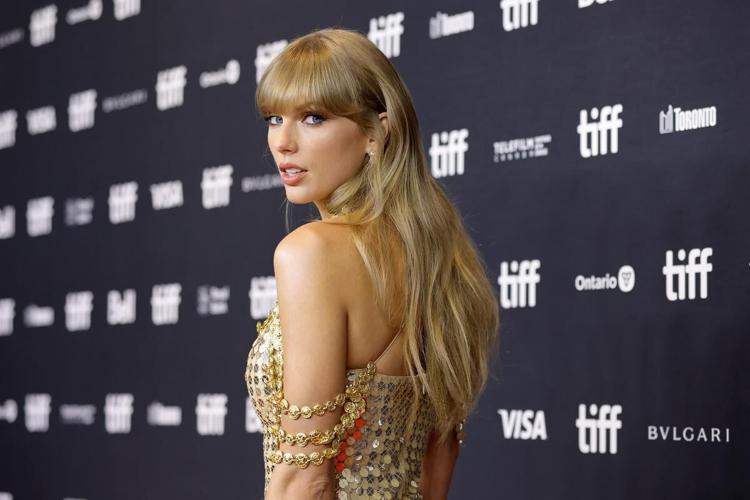Taylor Swift has always been one step ahead of the rest of us.
With her tenth studio album ŌĆ£Midnights,ŌĆØ Swift rifles through the pages of her personal life like a scrapbook, giggling at inside jokes and revelling in the creative choices that propelled her to stardom over a decade ago.
But inside that scrapbook lies real pain, too. It seems Swift might not love her mega-celebrity status or its cast over her relationships. The eating disorder to which she alluded in her 2020 documentary ŌĆ£Miss AmericanaŌĆØ might have been more significant than was ever made public. She might still be feeling the sting of 2016ŌĆÖs #TaylorSwiftIsOverParty.
In 13 tracks, ŌĆ£MidnightsŌĆØ explores the no-manŌĆÖs-land between the glitter of a budding romance and the grime of a life shaped by speculation. Sonically, SwiftŌĆÖs revisited production elements which on previous records felt inauthentic to her songwriting ŌĆö here, theyŌĆÖre right at home. The hip-hop reverb of ŌĆ£ReputationŌĆØ has matured into a softer lo-fi; ŌĆ£LoverŌĆØŌĆÖs soft pop has crystallized into something sexier, with controlled vocal fry to match; the poetic storytelling which made ŌĆ£FolkloreŌĆØ feel like such a departure for Swift has continued and even strengthened.
And then come the bonus tracks ŌĆö because Swift is always plotting. Dubbed the ŌĆ£3AMŌĆØ songs, theyŌĆÖre an extra seven tunes which, according to Swift, were written during the ŌĆ£MidnightsŌĆØ sessions but scrapped from the 13-track concept album. Though ŌĆ£MidnightsŌĆØ was officially released at 12 a.m. on Oct. 21, the ŌĆ£3AMŌĆØ B-side was, you guessed it, released to the hounds just three hours later. Swift teased the move as a ŌĆ£chaotic surpriseŌĆØ on social media, but the albumŌĆÖs unmarketed back half thrillingly complements its openers. Here, ŌĆ£FolkloreŌĆØ collaborator Aaron Dessner rejoins buds Swift and producer Jack Antonoff, and suddenly weŌĆÖre back in a more alternative sonic wonderland, trawling through memories of late-stage girlhood with bite, poise and iridescent synth.
In short, ŌĆ£MidnightsŌĆØ might be the best album of SwiftŌĆÖs discography.

This image released by Republic Records shows “Midnights” by Taylor Swift.
Republic Records via APItŌĆÖs going to be divisive. Swift and her team marketed the bejeezus out of this record ŌĆö as well they should. But the aesthetic wafted in front of fansŌĆÖ noses (and credit cards) seemed to promise an oh-so-trendy retro album, dripping in ŌĆś70s colours and props. In the absence of a lead single, Swifties, preordered vinyls in hand, could daydream about what sound was waiting for them at midnight on Oct. 21 ŌĆö and it was reasonable to imagine that, given the marketing, they were in for an ABBA/Fleetwood Mac-style romp through 13 stories of midnights past.
What we have here is very, very good ŌĆö itŌĆÖs as pleasant a surprise as false advertising can be ŌĆö but if you were waiting for a throwback nostalgia record, this isnŌĆÖt it.
Except, well, maybe it is ŌĆö itŌĆÖs a nostalgia for everything that makes Swift the deity sheŌĆÖs become, a slide show of Swift at her most irreverent throughout the years. ItŌĆÖs unapologetic lyrics about cats; itŌĆÖs sparkly dresses and razor-sharp eyeliner wings; itŌĆÖs pointed commentary on influencer culture (ŌĆ£Sometimes I feel like everybody is a sexy baby and IŌĆÖm a monster on the hill,ŌĆØ croons Swift on ŌĆ£Anti-HeroŌĆØ). Vocally, Swift sounds great, and her musical hooks are ready to explode on TikTok ŌĆö ŌĆ£Anti-HeroŌĆØ may not have been a lead single, but it could have been, a pop anthem that feels like the cool, clove-cigarette-smoking older sister of ŌĆ£1989ŌĆØŌĆÖs ŌĆ£Blank Space.ŌĆØ
What prevails on ŌĆ£MidnightsŌĆØ is SwiftŌĆÖs maturity, the removedness with which she gazes upon younger versions of herself. ŌĆ£YouŌĆÖre On Your Own Kid,ŌĆØ the newest member of SwiftŌĆÖs infamous roster of scorched-earth Track Fives, peels back the layers on a deeply insecure former self ŌĆö ŌĆ£I hosted parties and starved my body,ŌĆØ Swift tells us with regret. ŌĆ£Give me back my girlhood, it was mine first,ŌĆØ she pleads to a much older ex-lover on ŌĆ£WouldŌĆÖve, CouldŌĆÖve, ShouldŌĆÖve.ŌĆØ
That maturity, too, is bolstered by campy, who-gives-a-damn-as-long-as-IŌĆÖm-having-fun storytelling. ŌĆ£I have this dream my daughter-in-law kills me for the money,ŌĆØ Swift says with a wink on ŌĆ£Anti-Hero.ŌĆØ ŌĆ£Karma is a cat purring in my lap ŌĆścause it loves me, flexing like a goddamn acrobat,ŌĆØ she gloats on ŌĆ£Karma.ŌĆØ These lyrics are Swift at her most indulgent, fleeting glimpses of Swift at a dinner party or mimosa-soaked brunch. Goofiness doesnŌĆÖt bog down the album: it humanizes it.
ŌĆ£FolkloreŌĆØ and its sister ŌĆ£EvermoreŌĆØ were a pivot for Swift, two introspective strands of a self shoehorned into isolation. The re-recordings of ŌĆ£FearlessŌĆØ and ŌĆ£RedŌĆØ which followed were echoes of youth, re-hashings of adolescent neuroses and triumphs and crushes and nerves.
Here, introspection and remorse join forces with intoxicating pop sensibilities. ŌĆ£MidnightsŌĆØ is Swift at her coolest and most confident, and sheŌĆÖs without a doubt grown up since the country-pop battle cries which framed her early work. But Swift is done hiding from the inaccessibility of her fame, the singularity of her demons, the publicity of her most vulnerable years. With ŌĆ£MidnightsŌĆØ comes an endearing fondness for the carousel of former selves which got Swift to where she is today, even for those selves which self-sabotaged or made imprecise creative choices.
ŌĆ£Everything you lose is a step you take ŌĆ” you have no reason to be afraid,ŌĆØ Swift sings to a younger Taylor on ŌĆ£YouŌĆÖre On Your Own, Kid.ŌĆØ
And sheŌĆÖs right. ŌĆ£MidnightsŌĆØ proves that the music was worth the hard parts.
Aisling Murphy is a Toronto-based general assignment reporter for the Star. Reach her via email: aislingmurphy@thestar.ca
4 stars






























To join the conversation set a first and last name in your user profile.
Sign in or register for free to join the Conversation